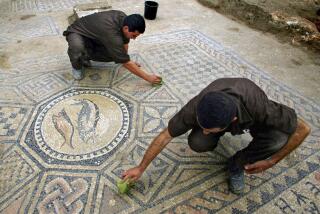Sarcophagus clash is put to rest
LIKE two mighty pharaohs who rule supreme over their respective 21st century realms, Zahi Hawass and John Rowe stared each other down last month over an ancient painted stone coffin.
Rowe, a history buff and the chief executive of Chicago energy giant Exelon Corp., owns the 2,600-year-old Egyptian sarcophagus and keeps it in his office. Hawass, the outspoken secretary-general of Egyptâs Supreme Council of Antiquities, said such artifacts should be on public display.
In the end, Rowe was the titan who blinked, agreeing to lend the sarcophagus to Chicagoâs Field Museum indefinitely. Hawass, in turn, agreed to restore peace to the public opening of the blockbuster traveling exhibition âTutankhamun and the Golden Age of the Pharaohsâ at the museum.
The jousting between the modern potentates began at a press preview of the exhibition. Rowe, who was supposed to have attended, instead was traveling in the Midwest with President Bush and sent an Exelon executive vice president, Randy Mehrberg, to represent him.
When Mehrberg got up to speak, he mentioned Roweâs love of Egyptian antiquities, noting that the chief executive kept a sarcophagus in a display case in his office.
Minutes later, an irate Hawass used part of his talk to admonish Rowe and demand that the piece be given up or Exelon be removed as a sponsor of the exhibition.
The upshot was that Field Museum President John McCarter went to work with all parties and fashioned the agreement.
Hawass is no stranger to such struggles. He fights passionately to get collectors and museums to return stolen artifacts and those of unknown provenance to Egypt. He is embroiled in an argument with the St. Louis Museum of Art, which he says bought a 3,200-year-old mummy mask that was stolen from Egypt sometime after 1959 -- a charge the museum has said has no basis in fact.
More to Read
The biggest entertainment stories
Get our big stories about Hollywood, film, television, music, arts, culture and more right in your inbox as soon as they publish.
You may occasionally receive promotional content from the Los Angeles Times.










